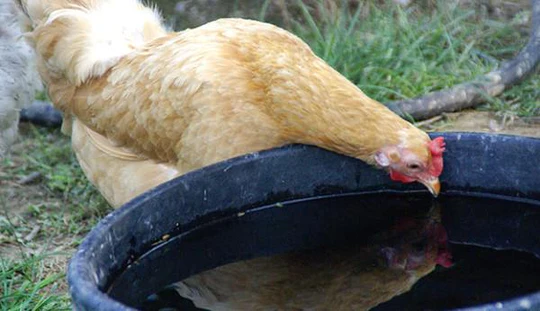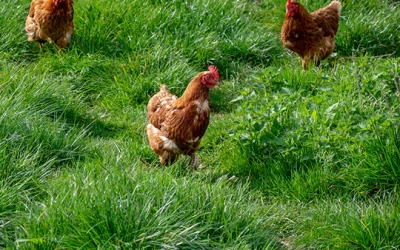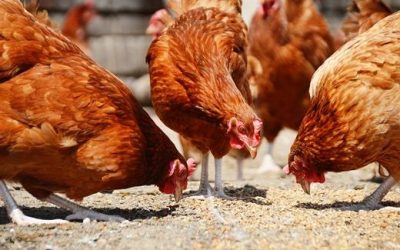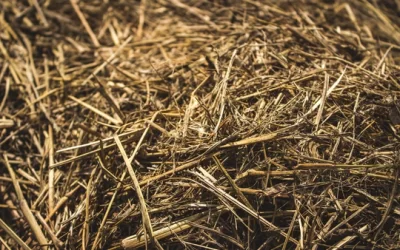Just like you, chickens need fresh, clean water to thrive. Follow these easy tips to quench your chicken’s thirst so they can be healthy, strong, and egg-cellent layers.
No Such Thing As “Too Much” Water For Chickens
While a chicken will drink, on average, a pint a day, it can vary widely depending on the season, the size of the hen, and the outside temperature. In the height of the summer when temperatures are climbing above 90 degrees, a single chicken can drink up to a quart in one day. That is why it is essential that you check your watering system often to make sure that your girls have a constant supply.
Fresh and Clean Water
Just like you do not love drinking water from a cup that has been sitting out for days, or has weird things floating in it, chickens want their water to be fresh and clean.
To keep your chicken’s water supply free from food, shavings, and other icky things, go for height. Either suspending the watering system from the ceiling of the coop or placing it on a stack of bricks or wood to raise it off the floor will keep the good water in and the yucky stuff out. Aim for the waterer to be as high as your shortest bird’s shoulders.
You can also try out a watering system with nipples— openings big enough to drink from, but tiny enough to keep the ick out. You will need to train your chickens how to use the nipples. Once one chicken figures it out, though, usually the rest will follow suit.
Warm Water? No Thanks
Have you noticed the similarities between your water preferences and your flock’s yet? Just like you, chickens are partial to cool water. While keeping water cool in the winter is not hard (more on that later), it can be an issue in the summer. The solution? Ice cubes! Keeping their water on the rocks will ensure they will want to keep drinking, especially when they need extra hydration in hot weather.
Frozen Water? No Thanks
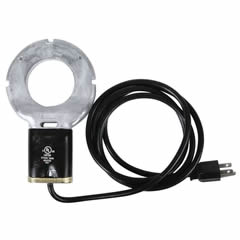 Wintertime brings the opposite struggle for water. With subzero temperatures, your watering system can easily freeze, completely cutting off the hen’s water supply. If you do not want to move the water into the coop (it can get wet, messy, and increase risk for frostbite), look into a thermostatically controlled deicer. These can come installed a watering system, or you can buy an individual one that you can place inside the system you already use. With either option, once your water reaches a certain temperature, the deicer will kick on and bring the water up to a temperature above freezing.
Wintertime brings the opposite struggle for water. With subzero temperatures, your watering system can easily freeze, completely cutting off the hen’s water supply. If you do not want to move the water into the coop (it can get wet, messy, and increase risk for frostbite), look into a thermostatically controlled deicer. These can come installed a watering system, or you can buy an individual one that you can place inside the system you already use. With either option, once your water reaches a certain temperature, the deicer will kick on and bring the water up to a temperature above freezing.
Supplements
To help your hens stay in tip-top shape, you may be interested in adding vitamins or supplements to their water like a chicken water protector. Apple cider vinegar can help their digestive system and liquid vitamins can maintain their egg production. Supplements can change the taste of the water, though, so when introducing the supplements, add them in gradually, increasing the dose over a few weeks so the chickens can get used to the taste and not go on a water strike.
Watering systems can also get rusty or grow algae, depending on what they are made of, so make sure you clean out your container regularly. Adding apple cider vinegar to the water will also discourage algae growth.
Chicken Watering Systems
You have a lot of options when it comes to chicken watering systems — here are four options to consider.
GALVANIZED METAL (Gravity fill) Chicken Watering Systems
Pros: traditional look, durable, vacuum pressure allows water level to remain consistent
Cons: reacts to vinegar, potential to rust, metal is sensitive to temperature so water will be colder in winter and hotter in summer, may have to fill daily or more often.
PLASTIC (Gravity fill) Chicken Watering Systems
Pros: non-reactive to vinegar and supplements, will not stain, and is better insulated against extreme temps
Cons: less aesthetically pleasing, may have to fill daily or more often
PLASTIC (Nipple) Chicken Watering Systems
Pros: non-reactive, non-staining, insulated, larger capacity than gravity fill waterers (only have to fill monthly), can sit on the floor (does not need to be raised)
Cons: teaching older chickens to use the system can be harder, so try to start with young chickens.
HOMEMADE Chicken Watering Systems
Pros: Can be more affordable, you control how it looks.
Cons: takes extra time and effort, can be harder to keep a consistent water level.
Why Every Chicken Coop Needs an Chicken Waterer
With a little effort and know-how, your chickens will be happy and hydrated. To get you started, check out Chicken Coops Delivered supply of waterers. Happy watering!
RELATED ARTICLES
Tips For Selecting A Chicken Coop
Are your chickens happy in their chicken coop?When you are looking for a home for your flock of chickens, keep in mind that to feel comfy, healthy, and happy, you need to make sure you are giving them the right amount of space—both in their coops and in their runs....
Solution To Five Chicken Feeding Problems
Feeding your chickens can be fun, but we are the first to admit, it can also be a pain. Cleaning out gunky feed, trying to hang your feeder, slogging through the rain or snow to top the feeder off before you leave for work... the list goes on and on! We have been...
Reasons Your Chickens Aren’t Laying Eggs
You know the routine - get up, get dressed, grab your coffee, and gather your morning eggs. But what happens when you walk out into the glistening morning, mug in hand and the nesting boxes are empty? Time for some troubleshooting. There are lots of reasons why your...

